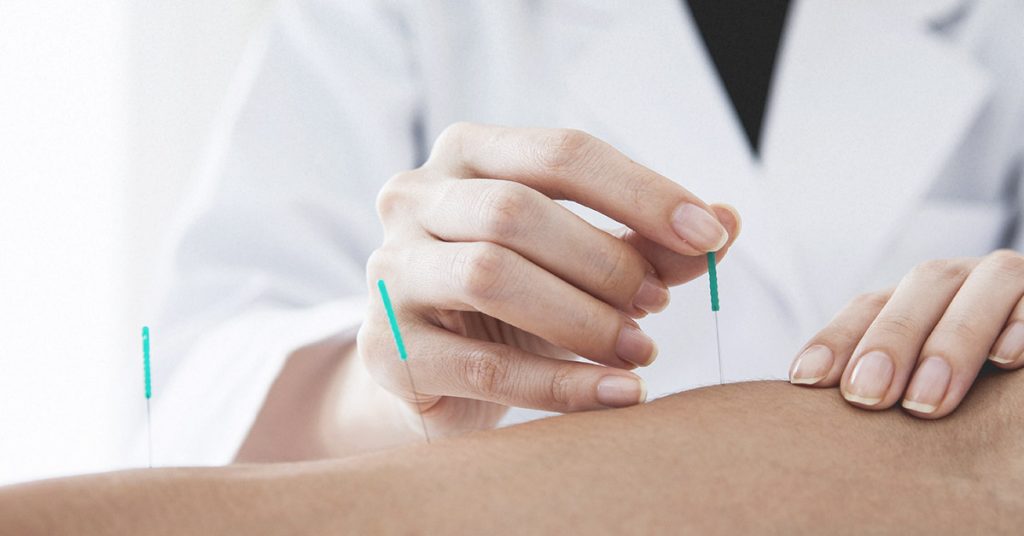Acupuncture is based on the Traditional Chinese Medicine belief that energy, or Qi (pronounced chi) is carried through meridians in the body. When the Qi is blocked or imbalanced it causes dysfunction and illness. When an acupuncture needle is placed into the meridian, this opens up the flow of Qi and helps alleviate symptoms, and the dysfunction or illness.
In Western medicine there has been many studies into the science behind acupuncture and how it works. Acupuncture points lay over parts of the body where nerves, muscles and connective tissue are best stimulated. The stimulation of these areas can increase blood flow, trigger the body’s natural painkillers, stimulate the body’s nervous system and connective tissues and increase the body’s healing process.
What can acupuncture help with?
Acupuncture has been recognized by the World Health Organization (WHO) as a valuable healing modality for over a large host of conditions, including:
- Stress and Anxiety
- Digestive Concerns
- Back Pain and Muscle Pain
- Fertility
- Injury Rehab
- Headaches and Migraines
- Labour Induction support
- Emotional challenges
- Smoking Cessation support
- Sleep Challenges
- Allergies
- Coughs and Colds
- Women’s Health, Menstrual Regulation and Menopause
Prior to treatment
- Eat a light snack or meal.
- Please wear comfortable clothing, that can be rolled up to the elbows and knees.
- Please avoid perfumes or aftershaves.
- Don’t smoke before receiving treatment.
- It is best to avoid caffeine or other stimulants for a couple of hours before you have acupuncture.
- If you wish, you are welcome to bring earplugs or eye masks.
During the treatment
Most acupuncture sessions last about 30 to 60 minutes. Your acupuncture visit will include an exam and an assessment of your overall health, the needle insertion treatment, and advice on self-care.
During the treatment you will be asked to lie down, either face-up, face-down or on your side, depending on where the treatment is to be applied. Single-use disposable sterile needles are inserted one by one.
During acupuncture treatment, very thin needles are applied through your skin at specific points of the body to encourage natural healing, reduce or relieve pain and restore the body’s balance by improving energy flow and function. For most people the procedure is painless, or produces only mild sensation.
Typically patients will feel the needles but with little or no pain, at least initially. An aching sensation is sometimes reported when the needle reaches the right depth. Once inserted, the needles are left in place for a short period of time (about twenty minutes) while you relax and let the treatment do its work.
Other acupuncture-related treatments may also be applied including acupressure, heat application, and electrical stimulation.
An acupuncture treatment course typically involves several weekly or biweekly treatments for up to 12 sessions.
After treatment
You are likely to feel more relaxed. You may feel sleepy or you may have more energy than when you came in. Try to connect with this sense before you return to the “real world”. Stay present with that heightened sense of awareness, and carry it with you into your day. Do not have alcohol/caffeine or smoke after your treatment. If the treatment was for pain or a painful condition, avoid strenuous activity for two days following.
There are few precautions of acupuncture, however it is important to let your clinician know if you have any of the following:
- Hemophilia
- Cardiac pacemaker
- Serious heart or lung condition
- Epilepsy
- Known or possible pregnancy
- Taking blood-thinning meds
- Blood-borne communicable diseases (ie. hepatitis, AIDS)
There are a few (very rare) complications of acupuncture:
- Infection
- Bruising
- Fainting
- Nausea
- Temporary aggravation of symptoms
- Broken needle (exceedingly rare)
What does the research say about acupuncture?
- A comprehensive study commissioned by the Department of Veterans Affairs found acupuncture to have a positive effect in the treatment chronic pain, migraine and tension headache.
- The same study found a potentially positive effect in dysmenorrhea, cancer pain, labor pain, insomnia, post-operative nausea and vomit, depression, and smoking cessation. [1]
- Acupuncture outperforms placebo in relieving the most common types of chronic pain: headache, low back, neck, shoulder and knee pain. [2]
- Acupuncture significantly outperforms standard care in headache, low back, neck, and knee pain.[3]
- Acupuncture is superior to most forms of physical therapy in the treatment of knee osteoarthritis.[4]
- The American College of Physiciansand American Pain Society recommend acupuncture as a second-line therapy for chronic low back pain.[5]
- The American College of Chest Physicians recommends acupuncture for cancer patients when pain, nausea, vomiting, or other side effects of chemotherapy are poorly controlled.[6]
References:
[1] Hempel S, Taylor SL, Solloway M, et al. Evidence Map of Acupuncgture. VAE-ESP Project #05-226; 2013.
[2] Vickers AJ, Cronin AM, Mascino AC, et al. Acupuncture for Chronic Pain: Individual Patient Data Meta-analysis. Arch Intern Med. 2012 Sep 10:1-10.
[3] Ibid.
[4] Corbett MS, Rice SJC, Madurasinghe, et al. Acupuncture and Other Physical Treatments for the Relief of Pain Due to Osteoarthritis of the Knee: Network Meta-analysis. Osteoarthritis Cartilage. 2013 Sep;21(9):1290-8.
[5] Chou R, Qaseem A, Snow V, et al. Diagnosis and Treatment of Low Back Pain: A Joint Clinical Practice Guideline from the American College of Physicians and the American Pain Society. Ann Intern Med. 2007;147 (7): 478-491.
[6] Cassileth BR, Deng GE, Gomez JE, Johnstone PA, Kumar N, Vickers AJ; American College of Chest Physicians. Complementary therapies and integrative oncology in lung cancer: ACCP evidence-based clinical practice guidelines (2nd edition). Chest. 2007 Sep;132(3 Suppl):340S-354S.

0 Comments Leave a comment